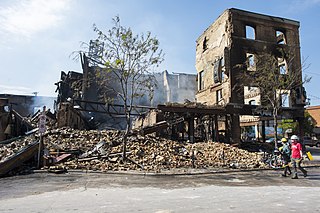
WCCO is a commercial AM radio station located in Minneapolis, Minnesota, and owned by Audacy, Inc. Its studios and offices are located on Second Avenue South in Downtown Minneapolis. WCCO features a news/talk format, with frequent newscasts and sports programming. Local hosts are heard most hours of the day and evening, including Chad Hartman, Vineeta Sawkar, Paul Douglas, Jordana Green and Adam Carter, Jason DeRusha, and Henry Lake. Overnight, two syndicated shows are carried: Our American Stories with Lee Habeeb and America in the Morning with John Trout. World and national news is supplied by CBS News Radio. WCCO is the flagship radio station for the Minnesota Twins baseball team.

The Hamilton Police Service (HPS) is the police service of the city of Hamilton, Ontario, Canada. As of 2021, the service employed 829 sworn officers and 414 non-sworn staff, serving a population of about 570 000 residents. The service's headquarters are located at 155 King William St., Hamilton, Ontario. As of 2022, the service's budget is $183 542 539, roughly 18.5% of the City's overall budget. It is one of the oldest police forces in Ontario.
Mobile Crisis, or Mobile Crisis Teams (MCT), are an emergency mental health service in the United States and Canada, typically operated by hospital or community mental health agency. They serve the community by providing emergency services to people in crisis, such as mental health evaluations, de-escalation, and/or pointers to local services (including potentially a ride). Evaluations are requested by hospital emergency rooms, ICUs, CCUs, jails, nursing homes, police, or EMS. These services are often available on a 24-hour basis. As of 2023, in parts of the USA and Canada teams can be called via the new suicide & crisis hotline 988 and some other crisis hotlines.

The I-35W Mississippi River bridge was an eight-lane, steel truss arch bridge that carried Interstate 35W across the Mississippi River one-half mile downstream from the Saint Anthony Falls in Minneapolis, Minnesota, United States. The bridge opened in 1967 and was Minnesota's third busiest, carrying 140,000 vehicles daily. It experienced a catastrophic failure during the evening rush hour on August 1, 2007, killing 13 people and injuring 145. The NTSB cited a design flaw as the likely cause of the collapse, noting that an excessively thin gusset plate ripped along a line of rivets, and that additional weight on the bridge at the time contributed to the catastrophic failure.

Minneapolis, officially the City of Minneapolis, is a city in and the county seat of Hennepin County, Minnesota, United States. With a population of 429,954, it is the state's most populous city as of the 2020 census. It occupies both banks of the Mississippi River and adjoins Saint Paul, the state capital of Minnesota. Minneapolis, Saint Paul, and the surrounding area are collectively known as the Twin Cities, a metropolitan area with 3.69 million residents. Minneapolis is built on an artesian aquifer on flat terrain, and is known for cold, snowy winters and hot, humid summers. Nicknamed the "City of Lakes", Minneapolis is abundant in water, with thirteen lakes, wetlands, the Mississippi River, creeks, and waterfalls. The city's public park system is connected by the Grand Rounds National Scenic Byway.

The Minneapolis Fire Department provides fire protection and first responder emergency medical services to the city of Minneapolis, Minnesota.

The Minneapolis Police Department (MPD) is the primary law enforcement agency in Minneapolis, Minnesota, United States. It is also the largest police department in Minnesota. Formed in 1867, it is the second-oldest police department in Minnesota, after the Saint Paul Police Department that formed in 1854. A short-lived Board of Police Commissioners existed from 1887 to 1890.
A Crisis Intervention Team (CIT) is a police mental health collaborative program found in North America. The term "CIT" is often used to describe both a program and a training in law enforcement to help guide interactions between law enforcement and those living with a mental illness.

On July 15, 2017, Justine Damond, a 40-year-old Australian-American woman, was fatally shot by 31-year-old Somali-American Minneapolis Police Department officer Mohamed Noor after she had called 9-1-1 to report the possible assault of a woman in an alley behind her house. Occurring weeks after a high-profile manslaughter trial acquittal in the 2016 police killing of Philando Castile, also in the Minneapolis–Saint Paul metropolitan area, the shooting exacerbated existing tensions and attracted national and international press.

Phillipe M. Cunningham is a former city council member for Minneapolis Ward 4 and the first transgender man of color to be elected to public office in the United States. Cunningham won the council position in the 2017 Minneapolis City Council election and lost it in the 2021 election.
Robert J. Kroll is an American former police officer and member of the Minneapolis Police Department. He was the president of the Police Officers Federation of Minneapolis, the police union for the police department, from 2015 to 2021. Over the course of his career, Kroll was involved in three officer-involved shootings, had 20 internal affairs complaints, and was the subject of several lawsuits. Kroll has been a longtime opponent to reforms of the police department, including calls to address racial bias within the force and reduce the number of people killed by police. Kroll has generated controversy on a number of occasions. In particular, his comments following the murder of George Floyd in May 2020 resulted in calls for his resignation, including from a number of unions, several former mayors of Minneapolis, and a former police chief. Kroll's comments were "Now is not the time rush to judgement and immediately condemn our officers. An in-depth investigation is underway. Our officers are fully cooperating. We must review all video. We must wait for the medical examiner’s report."

CAHOOTS is a mental-health-crisis intervention program in Eugene, Oregon, which has handled some lower-risk emergency calls involving mental illness and homelessness since 1989. This makes it the earliest, or one of the earliest, Mobile Crisis Teams.

Local protests over the murder of George Floyd, sometimes called the Minneapolis riots or the Minneapolis uprising, began on May 26, 2020, and within a few days had inspired a global protest movement against police brutality and racial inequality. The initial events were a reaction to a video filmed the day before and circulated widely in the media of police officer Derek Chauvin kneeling on Floyd's neck for 9 minutes and 29 seconds while Floyd struggled to breathe, begged for help, lost consciousness, and died. Public outrage over the content of the video gave way to widespread civil disorder in Minneapolis, Saint Paul, and other cities in the Minneapolis–Saint Paul metropolitan area over the five-day period of May 26 to 30 after Floyd's murder.

As a reaction to the murder of George Floyd on May 25, 2020, racial justice activists and some residents of the Powderhorn community in Minneapolis staged an occupation protest at the intersection of East 38th Street and Chicago Avenue with a blockade of the streetway lasting over a year. The intersection is where Derek Chauvin, a white police officer with the Minneapolis Police Department, murdered George Floyd, an unarmed 46-year-old Black man. Activists erected barricades to block vehicular traffic and transformed the intersection and surrounding structures with amenities, social services, and public art depicting Floyd and other racial justice themes. The community called the unofficial memorial and protest zone at the intersection "George Floyd Square". The controversial street occupation in 2020 and 2021 was described as an "autonomous zone" and a "no-go" place for police, but local officials disputed the extent of such characterizations.

The police abolition movement gained momentum in the U.S. city of Minneapolis during protests of the murder of George Floyd in 2020 and culminated in the failed Question 2 ballot measure in 2021 to replace the city's police department with a public safety department. The measure would have removed minimum staffing levels for sworn officers, renamed the Minneapolis Police Department as the Minneapolis Department of Public Safety, and shifted oversight of the new agency from the mayor's office to the city council. It required the support of 51 percent of voters in order to pass. In the Minneapolis municipal election held on November 2, 2021, the measure failed with 43.8 percent voting for it and 56.2 percent voting against it.

The aftermath of the George Floyd protests in Minneapolis–Saint Paul describes the result of civil disorder between May 26 and June 7, 2020, in the Twin Cities metropolitan area of the U.S. state of Minnesota. Protests began as a response to the murder of George Floyd, a 46-year-old African-American man on May 25, after Minneapolis police officer Derek Chauvin knelt on Floyd's neck for 9 minutes and 29 seconds as three other officers assisted during an arrest. The incident was captured on a bystander's video and it drew public outrage as video quickly circulated in the news media by the following day.
Reach Out Response Network is a Toronto based organization that advocates for the City of Toronto to increase community-led responses to mental health emergencies.

The Toronto Community Crisis Service (TCCS) is the non-police crisis intervention pilot program operated by the City of Toronto. The program runs in four areas of Toronto and partners with local community health agencies, which provide crisis workers. The program is integrated with the local 2-1-1 and 9-1-1 call centres.














